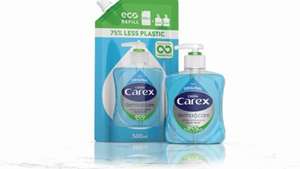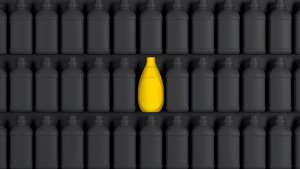Refilling the market gaps | Category focus – reusable packs

A recent report from GlobalData suggests that refillable packaging is a growing trend in line with public demand. It shows that 71.3% of UK consumers are willing to use food refill services and while some on these shores are quick to point the finger abroad, it’s interesting to note that the GlobalData 2019 Q3 survey revealed that 71% of Asia-Pacific (APAC) consumers look for reusable and refillable product packaging.
Rich Quelch, global head of marketing at Lifestyle Packaging, says it is a strategy, gaining popularity and momentum in the Fast-Moving Consumer Goods (FMCG) market, particularly in the food and personal care industry. “This aims to eliminate single-use packaging completely and challenges brands to invest more in packaging design and materials with longevity (such as glass, wood and metals) to create objects which last for years rather than the lifespan of one product,” he says.
“On the part of the consumer, although refillable goods require additional effort on their part, encouraging behaviour change isn’t difficult as environmental issues push higher up the global political and social agenda.”
Perhaps unsurprisingly, refillable packaging is more popular among younger shoppers. GlobalData’s monthly survey of 2,000 UK respondents found that 44.1% of 16-24 year olds who had purchased food and grocery products in July had used a refill station in the last 12 months, compared with 35% of 25-34 year-olds and just 25.4% of 35-44 year-olds.
“By the end of 2020, Millennials will make up 30% of all retail purchases, adds Quelch. “So, introducing sustainable features to product packaging is no longer an option – it’s a necessity.”
Supermarkets
In December, PN touched on refillables in the foodservice sector, raising questions about hygiene, carbon footprint related to choice of material and resilience of containers. The same concerns will obviously apply to those reusing containers for weekly shops at supermarkets.
In November, plastic pollution campaigning organisation City to Sea launched an ambitious pilot with retailers, independents and high-street chains including Leon, Neal’s Yard Remedies, Pret, Morrisons, Asda and Waitrose to champion refillable solutions.
The three month trial took place in Oxford and Bristol. App users in these locations were able to use the free app to find out where to fill up water bottles, coffee cups, lunch-boxes, groceries, cleaning products and toiletries.
The expanded Refill campaign will, for the first time, connect conscious consumers with all the locations across the UK that are offering refillable options and will also highlight discounts that reward them for bringing their own container.
City to Sea chief executive Rebecca Burgess says: We’re thrilled with the response so far to our expanded Refill campaign and are optimistic we’ll be rolling this out nationally in 2020 – enabling consumers to reduce their use of single use plastic and connecting them to discounts and rewards when they make the switch. It’s brilliant so many forward thinking businesses have joined the pilot and are looking at alternatives to single-use packaging by trialling refill options.”
Supermarkets involved in the pilot have recently announced details of their individual schemes with Waitrose being one of those at the forefront.
“Currently Waitrose is the only UK grocer to trial a refill initiative in four of its stores,” says Emily Salter, analyst at GlobalData Retail. “Yet 71.3% of consumers across all demographics would be willing to use a similar service, signalling the potential of such initiatives. As other retailers seek to reduce reliance on single-use packaging, this is a sure-fire way to do so.”
That pressure will spread beyond the big supermarkets as many smaller retailers have already embarked on similar initiatives. Some, however, may have to overcome a few obstacles.
“Dedicated independent refill stores are often more expensive than normal supermarkets, as the products sold are often more ethical and environmentally friendly, leading to the perception that products purchased at refill stations are more expensive than their packaged counterparts,” adds Salter.
Waitrose transformed its Botley Road shop last June taking more than 200 products out of packaging.
The shop is said to have the largest number of loose fruit and vegetable lines of any national supermarket and has removed plastic wrap from its flowers and indoor plants. It also has refillable options for various products including wine, beer, cereals, coffees and cleaning products.
In December the retailer confirmed that sales of refillables at its four Waitrose Unpacked shops are outselling their packaged equivalent by 68%.
Rachel Edmonds, customer proposition manager at Waitrose & Partners, says: “We saw an opportunity to fundamentally change the shopping journey. If you physically put options in front of customers, how would they respond?”
Quite favourably it would seem. News of the trial was spread quickly, as Edmonds points out: “We trumped Trump on the BBC News app.”
At the Botley Road store, refillable essential Waitrose fusilli pasta and long grain rice are outselling their packaged versions by 37% and 78% respectively. Refillable porridge oats are also up 78%, red lentils are up by 62% and dried soft figs by almost 50%.
While Waitrose (which offers a discount as an incentive) has taken a lead with dedicated stores, other major retailers are also taking steps. This year Asda customers can use their own refillable containers in stores during a three month trial and Morrisons has introduced cleaning products available in refill pods. The OceanSaver pods will allow customers to reuse their existing spray bottles just by adding the pods and mixing them with water.
Tesco, meanwhile, along with a number of consumer goods companies, is working with international recycling company TerraCycle in the Loop system, a business model for premium durable packaging which is delivered directly to the consumer, returned and refilled, a scheme that also takes container cleaning out of the hands of the consumer. The idea behind it is to eliminate unnecessary waste before it happens.
The Loop system also takes brand loyalty into consideration, something that could be significant in motivating people to switch.
“Getting brands on board will be a challenge as many consumers will prefer to buy some items from certain brands,” said Salter. “TerraCyle’s Loop scheme proves that this could be possible though, as it has partnered with international companies including Unilever and Nestlé to allow their products be included in the trial.”
Cosmetics and Personal Care
Some of the more adventurous refillable pack designs can be seen in the cosmetics and personal care markets. Last year, Unilever unveiled ground-breaking reusable packaging innovations including refillable packs which are also being trialled on the Loop system.
Four Unilever brands were among the first to trial new formats, including Dove, Rexona (known as Sure in the UK and Degree in the US) and AXE (known as Lynx in the UK); all testing a premium, refillable deodorant stick called Minim.
“We want to put an end to the current ‘take-make-dispose’ culture and are committed to taking big steps towards designing our products for re-use,” says Alan Jope, chief executive of Unilever.
Olay recently offered its best-selling Olay Regenerist Whip moisturiser with a refill pod that fits right in the jar. Consumers can purchase the Olay Regenerist Whip Limited Edition Pink Ribbon Face Moisturizer + Single Use Refill, which contains one full, limited edition pink jar of the Olay Regenerist Whip and one full refill pod of moisturiser that can be placed inside the jar once it’s emptied.
Brand design agency PB Creative worked with PZ Cussons to create new graphic designs for refill packs across the Carex Dermacare hand wash range.
“These [recyclable] refill pouches encourage consumers to replenish and reuse existing Carex hand pumps and bottles and use around 85% less plastic per gram of product compared to the equivalent Carex bottles,” says Pete Hayes, PB Creative’s co-founder and managing partner. “It’s not just the bottles themselves that should be reused, typically the pumps are engineered to last significantly longer than required to dispense the 250ml contained within the original primary pack.
“And as with the majority of pumps and trigger sprays, the internal mechanism contains a metal spring which makes them non-recyclable, so prolonging their use through refilling can offer a significant improvement on the brand’s overall sustainability credentials.”
These developments show that, while refillable options might signal less packaging in future, innovation and pack design continues to play a significant role in rising to the environmental challenges.
